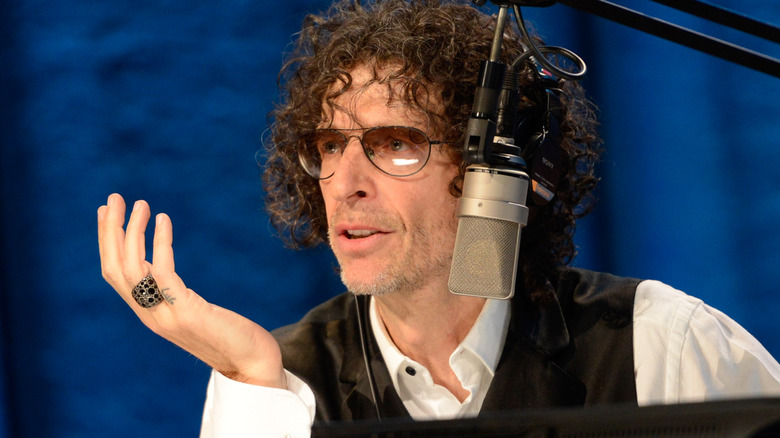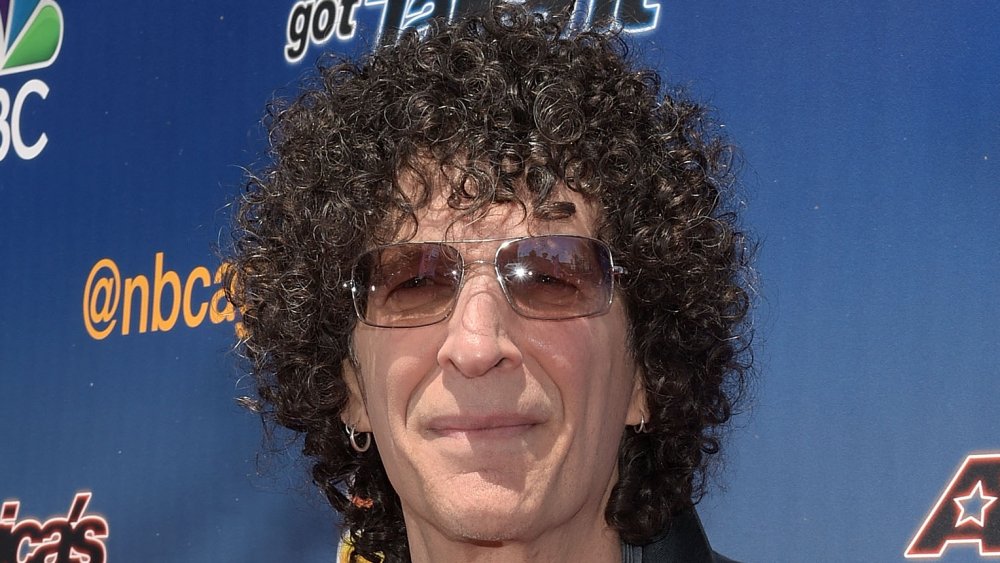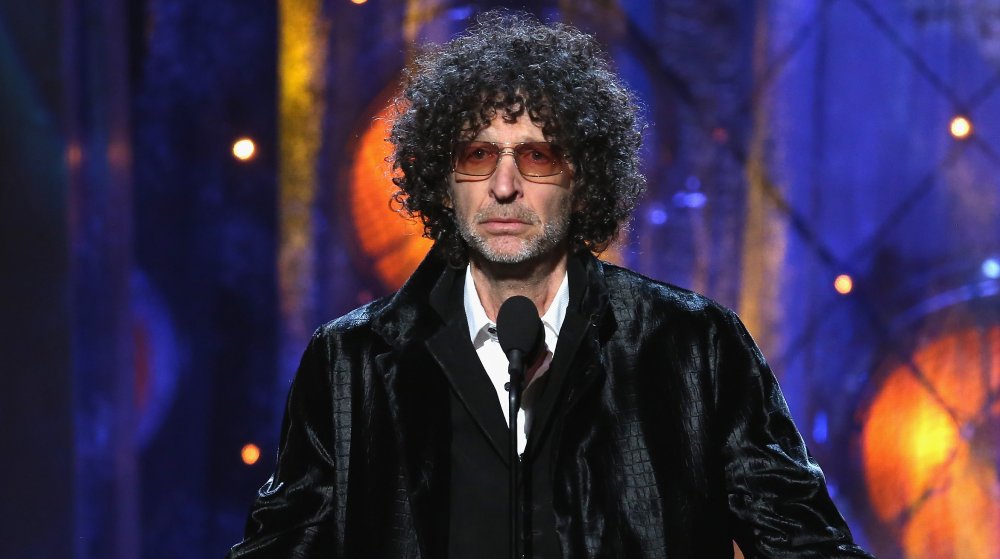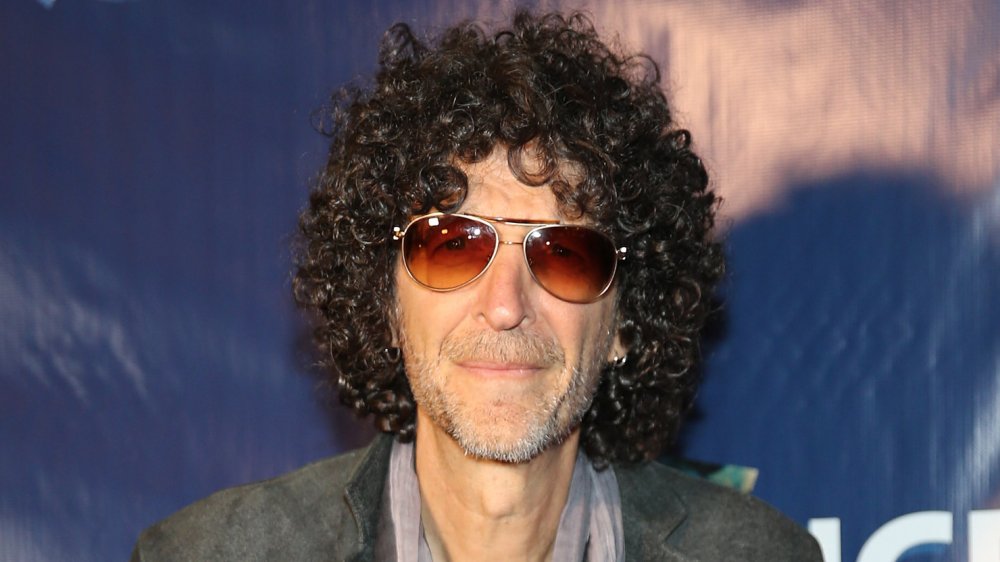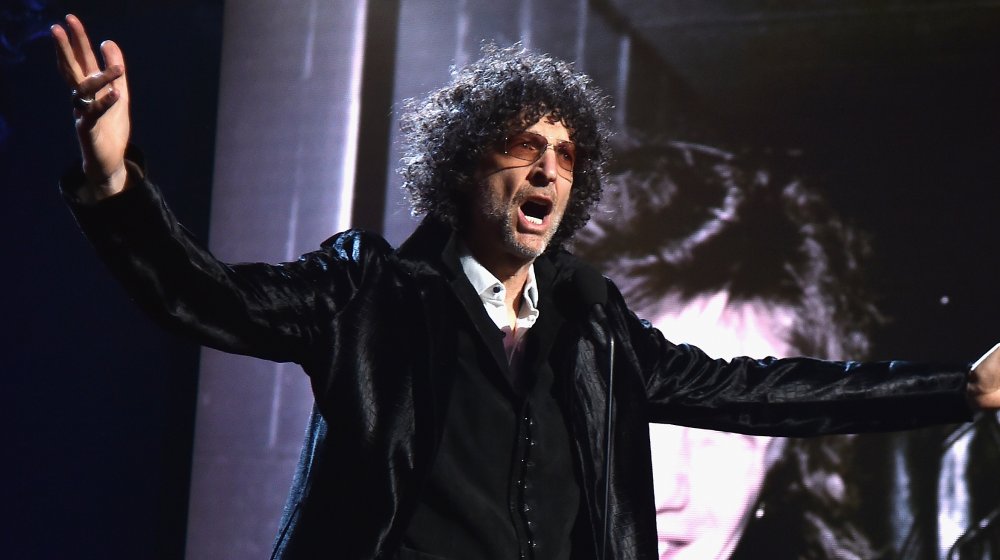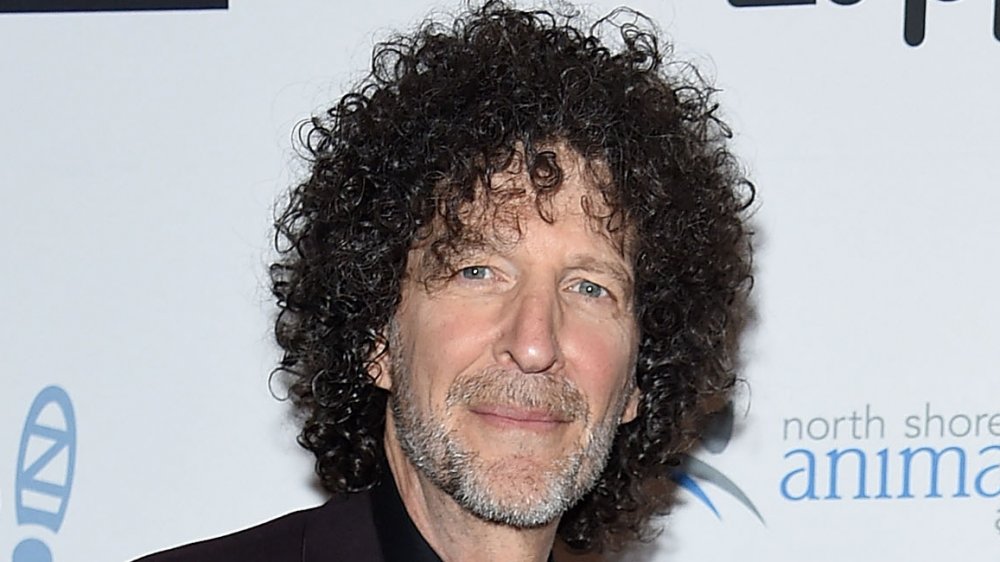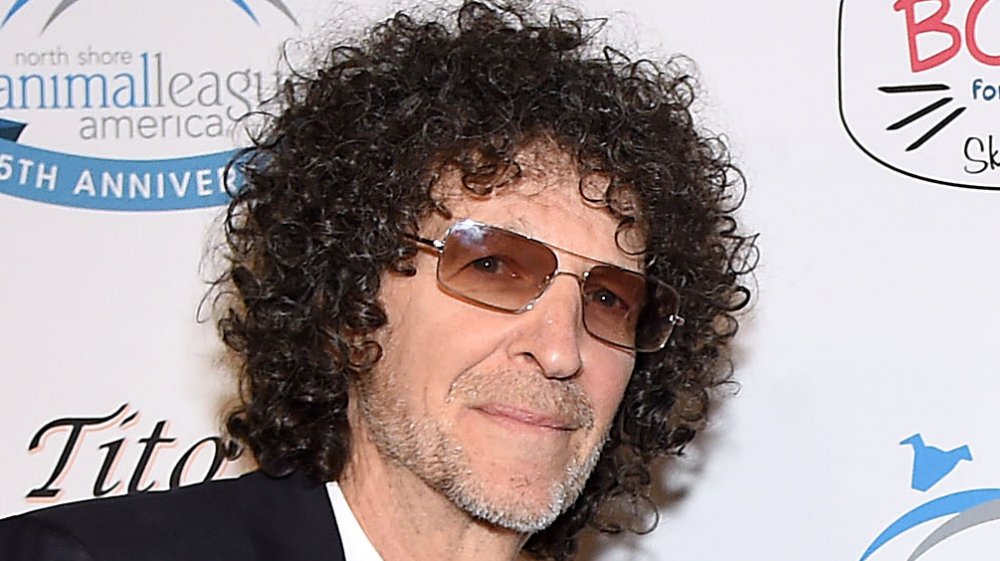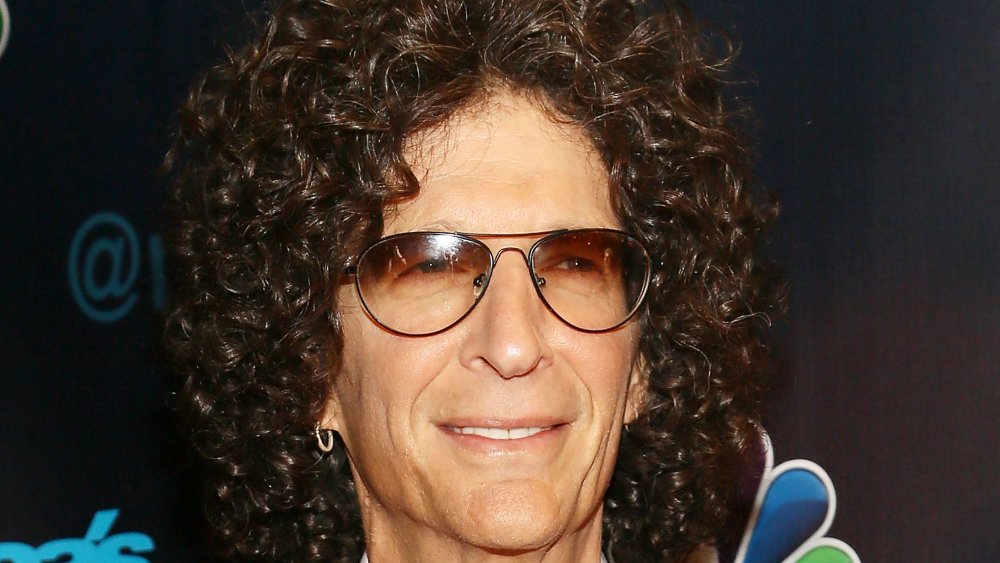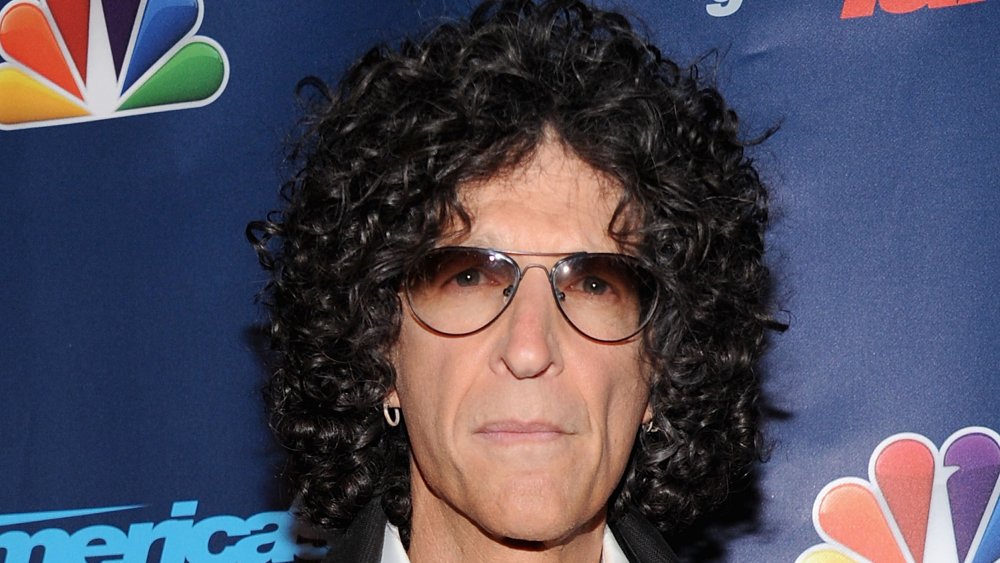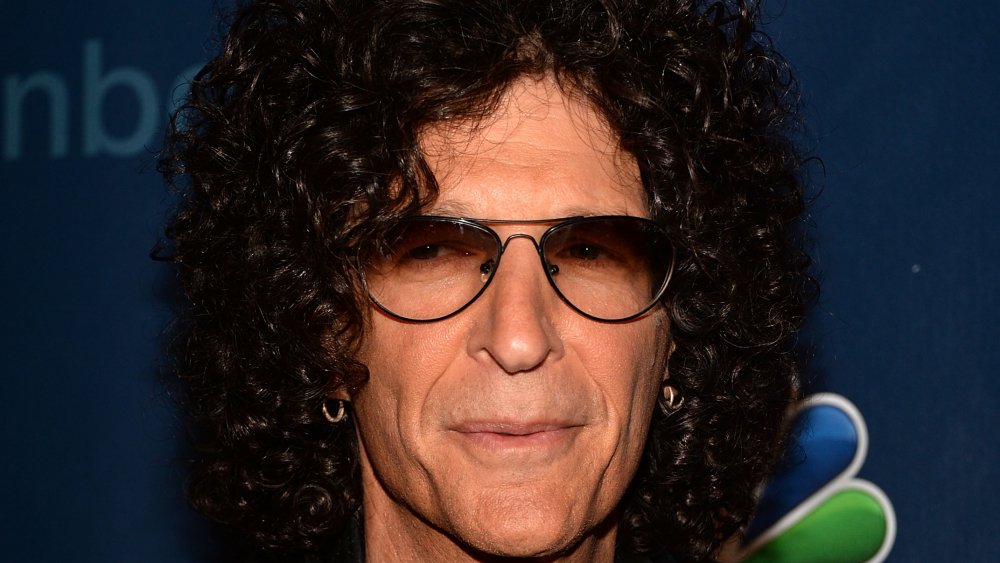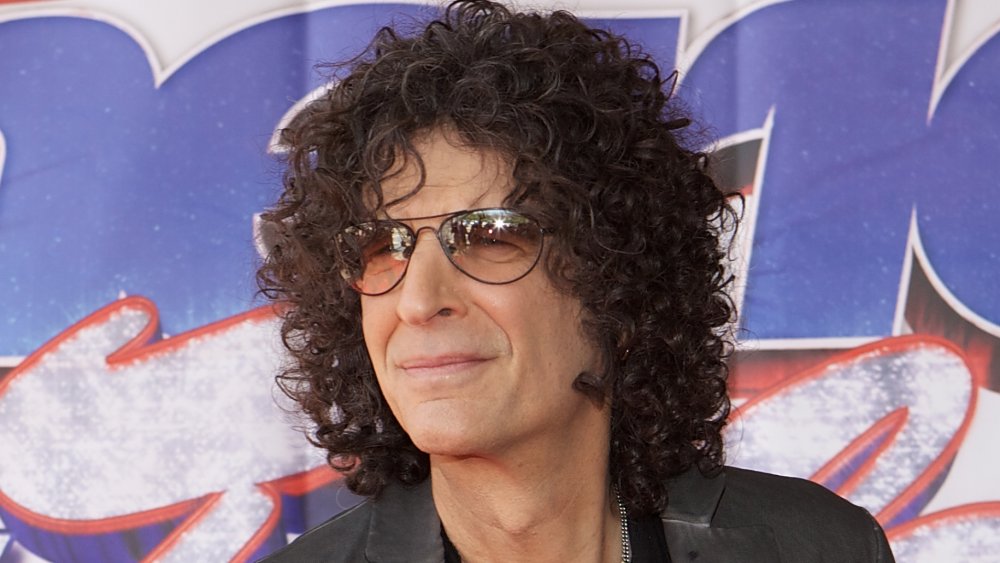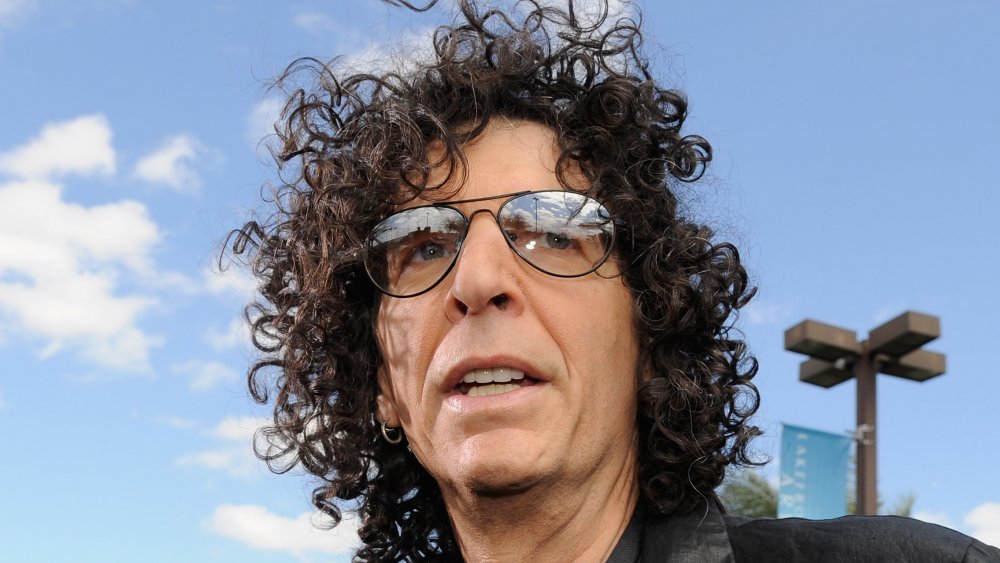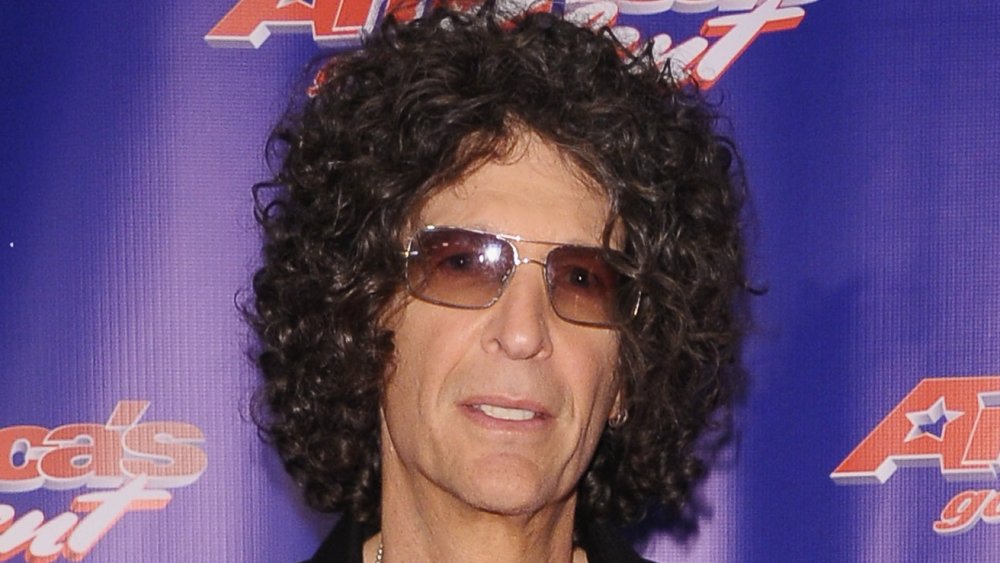The Tragic Real-Life Story Of Howard Stern
Howard Stern is one of the greatest and most polarizing interviewers of all-time. Starting right after college, he pursued his passion for broadcasting and quickly made a name for himself, though for reasons many disapproved of. Stern became known for his no-filter, highly personal discussions that often revolved around sexual topics. His radio show, The Howard Stern Show, aired nationally from 1986 to 2005, and the following year, he switched to satellite radio (via The New York Times).
In that time, he's referred to himself as the "King of All Media." Stern is the author of three books: Miss America, Howard Stern Comes Again, and Private Parts, which he turned into a movie in the late '90s. Even with a long tenure and seemingly dream job, Stern struggled with major problems, and this former "shock jock" had to change his approach throughout the years. "I tried to watch some of my old Letterman [appearances]," Stern said in a SiriusXM radio interview (via Washington Post). "I couldn't get through two minutes of it. It's just not me. I don't know who that guy is." At the same time, he dealt with family troubles, inner turmoil, and a few failures along the way.
How long have you been listening to the "King" work his magic? Which Stern interview is your favorite? Cry out your best "Baba Booey" before diving into the tragic real-life story of Howard Stern.
Howard Stern couldn't keep a job
Terrestrial radio stations had a tough time figuring out what to do with Howard Stern early in his career. His controversial comments brought fans but also put pressure on show executives. In 1982, Stern's run at DC-101 reached a breaking point. "Stern was suspended after criticizing his station management and two other radio stations," The Washington Post reported. The young deejay said the decision took him by surprise, saying, "I've really tried to fulfill my contractual agreement to DC-101. I've been treated very shabbily."
Stern quickly landed on his feet at WNBC radio in New York that same year. But history repeated itself, and after three years on the air, Stern was once again fired. "I never lead a dull life," he said (via The Washington Post), "but I'm pretty shocked at this one. We just had our highest ratings ever. I guess it's the nature of the beast to get fired." With two years remaining on a five-year contract, the station's vice president cited "conceptual differences" as the main reason for releasing Stern. "An examination of [Stern's] programs over a period of time showed a divergence of opinion and we didn't feel we could resolve it," John P. Hayes Jr. said. "In the best interests of the station, we thought we should try something else." This put an end to Stern's career working as a deejay for other stations but set the groundwork to start his own show.
He lost the love of his life
The first words people think of about Howard Stern probably aren't "romantic family man." And yet, the shocking deejay married "his college sweetheart, Alison [Berns]," with the couple sharing three daughters together (via The Hollywood Reporter). However, while Stern's career took off and he became a household name, the couple ultimately split, with Berns leaving him in 1999. "Divorce was so theoretical to me because no one in my family had really been divorced," Stern confessed to Rolling Stone. He cited his parent's long-time relationship as a model he couldn't live up to. "I was with my ex-wife since college, so it felt like such a failure."
He also admitted the separation was difficult for his children. And like so many others who have loved and lost, Stern dwelled on what went wrong in the relationship. "I think there were a lot of stressors, especially with what I did for a living," he said. Not surprising, given his history of controversy and penchant for interviewing porn stars. Still, the two stayed together until it could just no longer work. He wondered "how things that were so good could go so bad." Stern admitted, "I think I'll spend the rest of my life trying to analyze that."
Howard Stern couldn't last in politics
With his rising popularity on the radio, Howard Stern wanted to take on another form of leadership. In 1994, he announced his candidacy for New York state governor, deciding to run as a libertarian in the New York Libertarian Party. According to The Washington Post, his platform consisted of just three main points: "reinstating the death penalty, forcing construction workers to work at night and staggering highway tolls to alleviate traffic jams." But, he also started with an exit strategy in mind. He claimed once his goals were accomplished, he would promptly vacate the seat. "It doesn't matter if you find me offensive," Stern said, adding, "I'll get out of office before I can really screw anything up."
Though many considered him a long shot to win the actual race, other candidates feared Stern would steal votes and hurt their chances. As Stern continued to receive more votes and approached reaching the final ballot, he abruptly ended the run. At the time, the deejay needed "to disclose his personal finances if he wanted to run." And "after unsuccessfully asking a judge to waive the requirement for him," Stern dropped out. Once back on the radio, Stern further explained his decision to his listeners. "I spend 25 hours a week telling you all the most intimate details of my life. One fact I've never revealed is how much I make and how much money I have," he said. "It's none of your business."
Howard Stern felt out of control
Behind all the bravado and scandalous discussions on The Howard Stern Show, the host mostly hid disorders that affected his daily routine. Years after becoming a star, Howard Stern admitted in his book, Miss America, that "he once suffered from an obsessive-compulsive disorder," Entertainment Weekly reported. According to the article, this OCD "forced him to enter rooms right foot forward."
Many years later, Stern continued to reveal his various quirks and "magical thinking" to help cope with stress and insecurities. "Let's say I was listening to your radio show and I would be like, 'Oh my God, I have to be better than her,'" he explained in an interview with NPR. "So I would tap on the radio three times above the speaker so that I was better than you," he confessed. "It was my attempt to control the world." Stern's respite from his compulsiveness came while working. On the air, he claimed it was easier to keep distracted and forget about his problems. But ultimately, "it was tough to ignore." Even worse, Stern would have serious physical reactions. "I became literally paralyzed," he said and thought "[the] magic would control it."
Psychotherapy helped heal Howard Stern's wounds
Working on the air for decades, Howard Stern matured in front of his listeners. That being said, he also burned bridges along the way. Looking back on his earlier days, Stern spoke with David Letterman on his Netflix series, My Next Guest Needs No Introduction, admitting, "I was just a young man full of rage." Looking back, it became clear that he erred in many relationships. "I've apologized to a lot of people," he claimed, adding, "I think I did a lot of growing up."
He attributes his progression and change of heart through the use of psychotherapy. With these tools under his belt, Stern said he finally started to appreciate life and the people around him — especially those who he particularly wronged, like Letterman. "I was angry. I was angry with you, that you were on television, that you had an audience. There was no rhyme or reason to it."
Stern confessed he betrayed the late-night host's trust, finally declaring "[he] was ashamed." As the radio personality summarized, "The reality was I loved you, and I really felt strongly about you."
Howard Stern struggled with self-image
On air radio seems like the perfect place to avoid body-shaming culture. Behind the mic, one can depend solely on personality and a sonically friendly voice. But Howard Stern confessed he struggled with self-image as he became more popular. As the New York Daily News recapped, Stern talked about enhancing himself through two plastic-surgery procedures. His first change happened shortly after filming his biographical film Private Parts. Stern went under the knife for rhinoplasty. According to the report, "Stern confessed that his biggest fear was not how he'd look after a nose job but how he'd sound." Instead, as an added bonus, the deejay said "the surgery actually improved his voice."
For his second procedure, Stern decided to go for liposuction "to suck out the waddle of fat under his chin." Though perhaps with some buyer's remorse, Stern revealed he felt few people — except his sister — noticed the changes. "It hasn't helped!"
He couldn't help his troubled mother
When others interview Howard Stern, he appears to talk about any subject willingly – including his upbringing in New York City. He credits his mom with several of the skills that turned him into a star. "The ability to interview people and read your subject comes from my mother being very demanding of me with one thing: that I should be able to read her mood and know what she wanted," he told Rolling Stone. Stern added, "I could look in my mother's eyes and know everything. When she was sad, when she was angry, what she was thinking. I was trained to make my mother happy." If that's not all, Stern has been honest about the darker times as well. In an interview for NPR, he opened up about his mother's mental issues. "My mother was a depressed woman — suicidal," he said.
Stern claimed his mother had a "terrible" life, as well as trauma at a young age that he thinks contributed to her unhappiness. He frankly said, "I was raised by a traumatized woman." While Stern noted she overcame many tough times, he still remembered, "I'd come home from school and she'd be sobbing." As a child, he didn't know how to react and was not equipped to help at the time. Stern confessed, "I thought it was all kind of for drama. I didn't know how real it was."
His sudden health issues provided a wakeup call
During his tenure on the radio, Howard Stern kept a relatively clean bill of health. That is until he received news that would alter his life. Doctor's noticed his white-blood-cell count dropping and recommended chemotherapy, he explained to Rolling Stone. Luckily for the radio personality, another doctor suspected an elevated mercury issue. Sure enough, Stern's levels were through the roof from "eating too much fish." He changed his eating habits and returned to a normal mercury level.
Suddenly, things got even scarier. As Stern revealed to the outlet, "I went and got this body scan, and then they tell me they think 95 percent chance I've got cancer in my kidney." On the day of his surgery in 2017, Stern canceled his daily show, but when he returned, he played it off as the flu. Luckily, the procedure went well for the deejay. It turns out a "cyst that had burst and there was nothing there," he said.
Looking back at the scenario, Stern told NPR that at first "[he] did not react well" and understandably, "[he] freaked out." But after the fact, he credits the experience, explaining, "[It gets] you into a frame of mind where you're like, wow, how much time do I have left? And what is it I'm really trying to accomplish with that time?"
The king of all neuroses
The same personal drive that turned Howard Stern into a nationally known name is also one of his biggest issues. "The curse is that I take it so seriously," he said about The Howard Stern Show to Rolling Stone, adding that it's not fulfilling enough to think he had a successful show. "No, I gotta know, do you think I did a good show and are you satisfied? And that's the neurosis and that's the source of all problems for me," he confessed. Plus, the more praise he received the more undeserving he felt. For example, Stern talked about a "Celebrity Superfan Roundtable" where his most famous fans shared their common love for the deejay. While listening, he said the celebs were "so complimentary that [his] OCD kicks in and [his] neuroses ... It's such insecurity."
In another story, Stern talked to NPR about the amazing news when a study claimed one out of four cars "in the largest market in the United States, New York, were listening and tuned into [him]." However, Stern looked at the report pessimistically and dwelled on the other three cars not listening. "So when you want everything and nothing satisfies you and you only want to be — in a narcissistic kind of way — the center of the universe and the focus, I was clearly a starved person who only would believe that the focus needed to be on me," he said.
Howard Stern wished he could take back terrible interviews
Even though he built a career of interviews that others would dream of, Howard Stern still regrets several moves. As an older and more mature deejay, Stern reflected on those times that now make him cringe. He admitted the younger Stern was completely self-obsessed and wanted to be the star of every interview. He needed to be the funniest person in the room. "You're not going to come into my studio and steal the moment from me. This is who I was," he told Rolling Stone.
Stern remembered an occurrence when George Michael came into his studio. "I said to him first thing, 'Are you gay?' OK. Yes, that's outrageous, and it's not fair to the guy." The deejay also created a remarkably uncomfortable interview with Gilda Radner. Stern revealed the SNL star cut the interview short, and while escaping, "banged her head on a speaker because she was so freaked out by me because I was insane."
But Stern's biggest regret of all is how he treated the late, great Robin Williams. "That haunts me," he confessed about the interview. Despite the deejay's complete love for the actor, "[he] was so angry at the world" and "[he] had to act like [he] didn't love him." Instead of a genuine discussion, Stern put on his outlandish persona. Stern said he threw away the opportunity to "celebrate an amazing talent and the beauty of that guy's career."
A family friendly gig turned out to be much more difficult
In 2012, Howard Stern planned to show off his sweet side — if that existed. He joined the summer variety show America's Got Talent as a judge "to the shock of his longtime agent, Don Buchwald," as revealed by The Hollywood Reporter. As Stern put it, "I had a reputation as a stark-raving lunatic before that." He lasted four seasons to the delight of fans — and his grand plan worked. "I went from America's nightmare to Santa Claus. Literally, people were putting their kids on my lap," he admitted.
After his TV stint, Stern sat with longtime friend Jimmy Kimmel and spilled his secrets about the show (via Yahoo!). The former judge said he "hated every minute" of the show and that the family-friendly format wasn't in line with him. "Here I am, Fartman, and to see me juxtaposed [within] a family show like that, was interesting to me," he said. Stern also joked that his body type is much better suited for a radio studio than on camera. "I'm six-foot-five, and the cameraman was shooting up my huge nostrils," he said. "I had no good side."
Howard Stern struggled with keeping friends as a child
Howard Stern was born in the Jackson Heights section of Queens, New York and grew up in Roosevelt, Long Island, and he remembers his neighborhood in rough shape. Speaking with Rolling Stone, Stern revealed, "when I was young, I was very misunderstood and I was put into a lot of dangerous situations." What's more, he felt his parents never addressed the poor living conditions. Stern claimed he lived in "such a bad neighborhood, and it was so disturbing to be one of the few white families left in the community." As he saw more and more of his friends move out of the neighborhood, he "never complained about it to [his] parents" but also "never allowed [himself] to feel anything about it." Thinking back, Stern still questions why he felt unable to discuss his feelings with his mother and father.
The deejay realized that later, after moving to a white neighborhood, the problems persisted. "It turns out it wasn't race, it was me! I was the awkward one," Stern confessed. He realized people of all colors hated him, and he "felt more alienated than ever."
While Stern felt alone, his realization is also what pushed him into radio. "I came to the revelation that if I was going to go anywhere ... I can't be playing records," he explained to Rolling Stone, adding, "if what I have to say was important, no one can replicate that."

